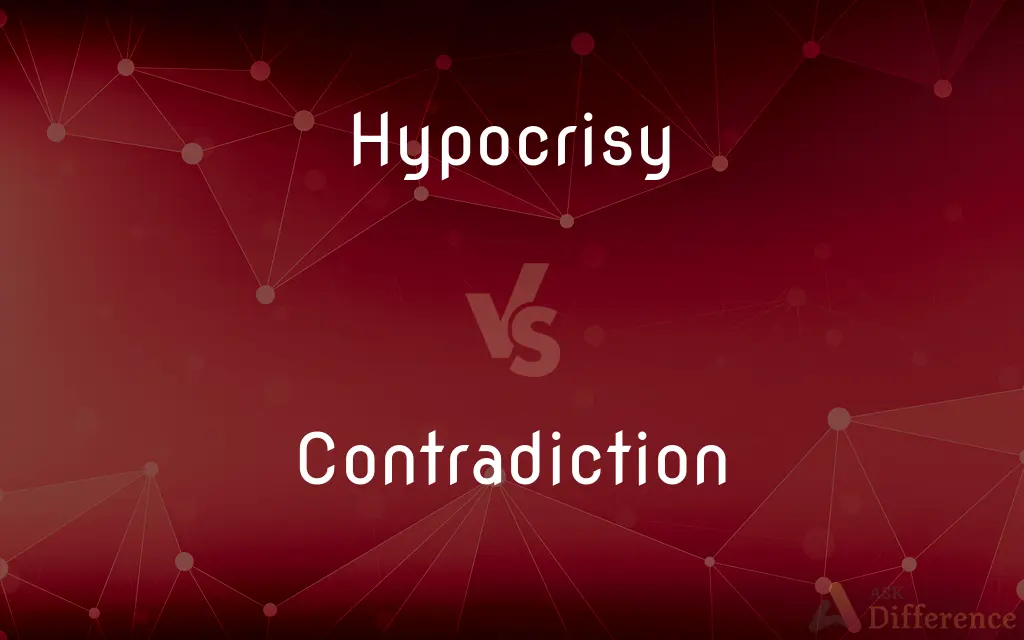Hypocrisy vs. Contradiction — What's the Difference?
Edited by Tayyaba Rehman — By Fiza Rafique — Published on October 21, 2023
Hypocrisy is the practice of claiming beliefs or virtues one doesn't possess, while contradiction refers to a statement or position opposing another previously stated.

Difference Between Hypocrisy and Contradiction
Table of Contents
ADVERTISEMENT
Key Differences
Hypocrisy is rooted in deceptive representation. When someone is hypocritical, they project an image, belief, or virtue externally but don't genuinely uphold or embody it internally. Contradiction, on the other hand, involves presenting two opposing statements, facts, or positions. It's not necessarily about deception but rather inconsistency.
In everyday scenarios, hypocrisy might manifest in someone who preaches about honesty but frequently lies. Contradiction would be if the same person says "Lying is always wrong" in one instance and then states "Sometimes lying is necessary" in another. Both statements can't simultaneously be true, marking a contradiction.
Hypocrisy often carries a moral judgment. Labeling someone as a hypocrite implies they are insincere in their beliefs or actions. Contradiction, however, is more neutral. It simply indicates that two statements or ideas conflict with one another and cannot coexist without causing logical dissonance.
One might say that all hypocrites are contradictory in their actions versus their stated beliefs. Yet, not all contradictions are indicative of hypocrisy. A person may hold contradictory beliefs without being deceptive or insincere, perhaps due to confusion or a change of mind.
Comparison Chart
Definition
Pretense of having virtues or beliefs not truly held
Opposition between two conflicting statements or positions
ADVERTISEMENT
Nature
Deceptive or insincere behavior
Logical inconsistency
Moral Judgment
Carries a negative connotation
Neutral, merely noting inconsistency
Application
More about behavior and character
More about statements or positions
Relation to Truth
Not necessarily about truth, but sincerity
Directly related to the truth or falsity of statements
Compare with Definitions
Hypocrisy
Deceptively showcasing morals one doesn't practice.
His hypocrisy was evident when he criticized others for the same mistakes he frequently made.
Contradiction
A logical inconsistency between two propositions.
Believing in both free will and predestination is often seen as a contradiction.
Hypocrisy
Pretense of having virtues or beliefs not genuinely held.
Preaching honesty while frequently lying is sheer hypocrisy.
Contradiction
A combination of statements, ideas, or features that oppose one another.
His speech was filled with contradictions, making it hard to understand his stance.
Hypocrisy
Behavior that contradicts what one claims to believe or feel.
For all her talk about conservation, her wastefulness showed her hypocrisy.
Contradiction
The denial of a statement's truth.
His story was filled with lies and contradictions.
Hypocrisy
Insincerity by virtue of pretending to have qualities or beliefs one does not actually possess.
His kindness was just an act, revealing deep hypocrisy.
Contradiction
The assertion of the opposite of a previously stated idea.
Saying I love ice cream and I hate ice cream is a contradiction.
Hypocrisy
A feigned or assumed appearance.
His concern for the environment was nothing but hypocrisy since he littered daily.
Contradiction
The act or an instance of contradicting
The witness's contradiction of other testimony.
Hypocrisy
The practice of professing beliefs, feelings, or virtues that one does not hold or possess; falseness.
Contradiction
The state of being contradicted
A supervisor who cannot tolerate contradiction from any subordinate.
Hypocrisy
An act or instance of such falseness.
Contradiction
An inconsistency or discrepancy
"Surprisingly few people saw a contradiction between freedom for whites and bondage for slaves" (Adam Hochschild).
Hypocrisy
The contrivance of a false appearance of virtue or goodness, while concealing real character or inclinations, especially with respect to religious and moral beliefs; hence in general sense, dissimulation, pretence, sham.
Contradiction
Inconsistency; discrepancy
Practices that are in contradiction to human rights.
Hypocrisy
The claim or pretense of having beliefs, standards, qualities, behaviours, virtues, motivations, etc. which one does not really have.
Contradiction
One that contains elements that oppose or conflict with one another
The phrase "an unmarried husband" is a contradiction in terms.
Hypocrisy
The practice of engaging in the same behaviour or activity for which one criticises another; moral self-contradiction whereby the behavior of one or more people belies their own claimed or implied possession of certain beliefs, standards or virtues.
Contradiction
The act of contradicting.
His contradiction of the proposal was very interesting.
Hypocrisy
An instance of any or all of the above.
Contradiction
(countable) A statement that contradicts itself, i.e., a statement that claims that the same thing is true and that it is false at the same time and in the same senses of the terms.
There is a contradiction in Clarence Page's statement that a woman should have the right to choose and decide for herself whether to have an abortion and at the same time she should not have that right.
There is a contradiction in what you say: she can't be both married and single.
Hypocrisy
The act or practice of a hypocrite; a feigning to be what one is not, or to feel what one does not feel; a dissimulation, or a concealment of one's real character, disposition, or motives; especially, the assuming of false appearance of virtue or religion; a simulation of goodness.
Hypocrisy is the necessary burden of villainy.
Hypocrisy is the homage vice pays to virtue.
Contradiction
(countable) A logical inconsistency among two or more elements or propositions.
Marx believed that the contradictions of capitalism would lead to socialism.
Hypocrisy
An expression of agreement that is not supported by real conviction
Contradiction
A proposition that is false for all values of its propositional variables or Boolean atoms.
Hypocrisy
Insincerity by virtue of pretending to have qualities or beliefs that you do not really have
Contradiction
An assertion of the contrary to what has been said or affirmed; denial of the truth of a statement or assertion; contrary declaration; gainsaying.
His fair demandsShall be accomplished without contradiction.
Contradiction
Direct opposition or repugnancy; inconsistency; incongruity or contrariety; one who, or that which, is inconsistent.
Can he make deathless death? That were to makeStrange contradiction.
We state our experience and then we come to a manly resolution of acting in contradiction to it.
Both parts of a contradiction can not possibly be true.
Of contradictions infinite the slave.
Contradiction
Opposition between two conflicting forces or ideas
Contradiction
(logic) a statement that is necessarily false;
The statement `he is brave and he is not brave' is a contradiction
Contradiction
The speech act of contradicting someone;
He spoke as if he thought his claims were immune to contradiction
Contradiction
A situation in which inherent factors are inconsistent or in opposition.
It's a contradiction to be a meat-eating animal rights activist.
Common Curiosities
How is contradiction defined?
Contradiction is the assertion of the opposite of what was previously stated or a logical inconsistency between two positions.
Can someone be both hypocritical and contradictory?
Yes, a person can be hypocritical in their actions compared to their stated beliefs and also make contradictory statements.
Are contradictions always false?
At least one of the contradictory statements must be false, as both cannot be true simultaneously.
What does hypocrisy mean?
Hypocrisy refers to the pretense of holding beliefs or virtues that one doesn't genuinely possess.
Is hypocrisy always intentional?
Not necessarily. Some people may be unaware of their own hypocrisy, while others are deliberately deceptive.
How is hypocrisy related to sincerity?
Hypocrisy is the opposite of sincerity, as it involves pretending to have virtues or beliefs not genuinely held.
Why is hypocrisy often criticized?
Hypocrisy is criticized because it represents dishonesty and a lack of integrity.
Can contradictory statements both be true?
No, in a direct contradiction, one statement must be false if the other is true.
Can contradictions exist in logical arguments?
Yes, logical contradictions indicate flaws or inconsistencies in an argument.
Is every contradiction indicative of hypocrisy?
No, contradictions can arise from confusion or changing beliefs, not necessarily from insincerity or hypocrisy.
How can one identify hypocrisy?
Identifying hypocrisy involves spotting a disconnect between one's professed beliefs and their actual behavior or actions.
Are contradictions always bad?
Not necessarily. Recognizing contradictions can lead to clearer thinking and better understanding.
Can societies be hypocritical?
Yes, societal hypocrisy can manifest when collective actions don't align with widely professed values or beliefs.
What can lead to contradictions in statements?
Contradictions can arise from miscommunication, changing opinions, or lack of clarity.
Can contradictions be resolved?
Often, with reflection and discussion, contradictions can be resolved or at least better understood.
Share Your Discovery

Previous Comparison
Net Sales vs. Net Income
Next Comparison
Disk Cleanup vs. Disk DefragmenterAuthor Spotlight
Written by
Fiza RafiqueFiza Rafique is a skilled content writer at AskDifference.com, where she meticulously refines and enhances written pieces. Drawing from her vast editorial expertise, Fiza ensures clarity, accuracy, and precision in every article. Passionate about language, she continually seeks to elevate the quality of content for readers worldwide.
Edited by
Tayyaba RehmanTayyaba Rehman is a distinguished writer, currently serving as a primary contributor to askdifference.com. As a researcher in semantics and etymology, Tayyaba's passion for the complexity of languages and their distinctions has found a perfect home on the platform. Tayyaba delves into the intricacies of language, distinguishing between commonly confused words and phrases, thereby providing clarity for readers worldwide.














































